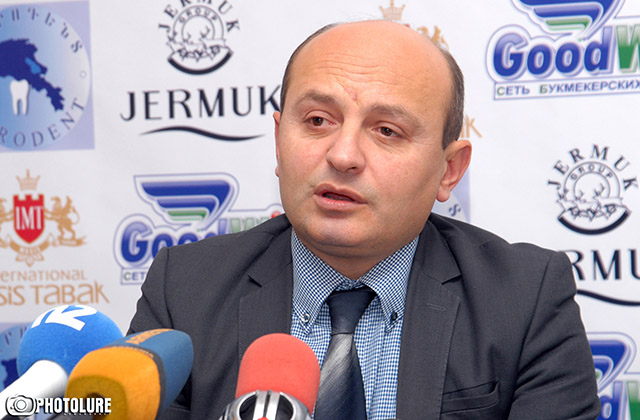Armenia will Considerably Change the Spirit of Security Environment if it Properly Reformulates its Role both for NATO and CSTO: Stepan Safaryan on Warsaw Summit

Another NATO summit will be held in Warsaw on July 8-9. Great importance was attached to that summit recently, as NATO faces serious challenges in the field of security and is going to “reply” to them. 168.am talked to Stepan Safaryan, head of the Armenian Institute of International and Security Affairs (AIISA), political analyst, who was recently back from Warsaw and followed preparation works of the summit and the atmosphere there.
Mr. Safaryan, prior to the next NATO summit, NATO officials touched upon new strategic directions, in particular , to strengthen the importance of NATO’s Western wing. In this new strategy, according to those statements the Black Sea and the Caspian Basins will have their special place. You’re just back from Warsaw, where you had meetings and participated in discussions on the topic. In your opinion, why is NATO going to materialize those programs and how will it attempt to overcome the challenges?
You’re right, everything starts from the point that NATO member countries seem to share the opinion that for NATO member countries, in particular, for Eastern Europe, Russia has basically become a strategic challenge. Both words are rather expressive, by the qualification “strategic” a long-term perspective is meant, i.e. NATO seems not to hope, that Russia will become a partner, a neighbor. Accordingly, “strategic challenge” isn’t accidentally used. In NATO member countries, in particular, in Poland, they consider that as a result of the last two years Russia not only generated serious threats for the bloc, but it also violated power balance, which need to be restored.
Thus, all diplomats from NATO member countries adopt resolutions, which will restore that violated balance. I can’t give names, however, from this perspective rather high-ranking officials consider that this NATO summit will be a cornerstone, and everybody is waiting for it to become a basis for a big process, which will lead to Russia’s restraint. Not accidentally main formula of the summit is being formulated in the following way: “restraint plus dialogue.” Of course, it’s difficult to imagine what it means both restraining Russia and have a dialogue with it under almost confrontation, however, in any case, NATO is opening a window for the settlement of relations with Russia, although a process parallel to it, the process of restraining Russia in Eastern Europe and in Southeastern Europe will go on.
What is important, in Poland, basically a new contingent is being developed like a battalion, which will be NATO’s rapid response power. It’ll be multi-national, and accordingly, will considerably change the balance of military powers, necessity of which is currently existent. As NATO officials represent, this is the result of the fact that Russia itself has basically changed military balance beyond the border of Poland.
On account of these threats, the importance of the South Caucasus for Russia, current nature of Armenia-Russia relations, Georgia’s Euro-Atlantic aspirations, in your opinion, how will NATO attempt to build its relations with the South Caucasus countries, including Armenia against the background of this new strategy?
The South Caucasus still remains a rather complicated region, where NATO is unable to have equal attitude towards all the countries for the simple reason that intentions of those countries to cooperate with NATO member countries have different speeds and different dialogues. In this regard, of course, the leader is Georgia, which, in fact, strives to become a full member of the alliance. Like formerly, many are incredulous, that at this summit Georgia and Ukraine will be offered a membership plan, as complexity of the issue is realized in NATO not only regarding the fact that Russia is sensitive to it, but Georgia has serious territorial issue with Russia, accordingly, not to get engaged in military-political conflicts with Russia NATO won’t hurry to make decisions to that end.
However, at Wales summit NATO issued Georgia the status of its number one partner, also rather unprecedented military trainings have been launched in the territory of Georgia, and this means, that we’ll record at least one step forward, than Wales summit, which will presuppose a status for Georgia, which won’t be a membership, and hereinafter it’ll be rather deep. Nobody was touching upon in Warsaw what formulations will be given to that status.
In this regard state of affairs in the South Caucasus is complicated. Armenia is a CSTO member country, in which Russia has a dictating position. Intention on bilateral level in relations is one: at least to maintain and to continue the cooperation between the sides. This satisfies to both sides.
Azerbaijan’s case is comparatively complicated. We remember how on the threshold of Wales summit Azerbaijan made an attempt to escalate the situation on NK conflict zone and Turkey was attempting to have its role in that process. I think, presently attempts will be made so that Turkish lobbying linked to NK conflict reached its purpose. Frankly speaking, during all my meetings and speeches I was repeatedly stressing and was urging that NATO was absolutely gentle in such an issue sensitive for Armenia, as it may threaten what is existent. We, surely, assess evolution of formulations throughout years, which we had in Wales summit, however, it’s of utmost importance for NATO-Armenia relations, that the dynamics continued, as Armenia is a rather stabile partner for NATO as a CSTO member country.
In the region Armenia appeared alone on Russian security zone, Georgia strives to involve in NATO, Turkey, Azerbaijan and Georgia have developed a tradition of comprehensive military-technical cooperation, which is more observed as a Western alliance on account of Turkey’s membership to NATO and Georgia’s aspirations, also a united air defense system is being developed between Armenia and Russia in the Caucasus. How is this reflected to Armenia’s image in NATO? Many experts consider that Armenia will also be regarded as a threat.
I don’t consider that Armenia will ever be perceived as a threat by NATO member countries. Armenia doesn’t intend to have complicated relations with NATO. However, the only concern that we expressed regarding united air defense system is that Armenia may become an arena for operations. Let’s start from the point that the only security system available in the Caucasus is CSTO. The only reality is that Russia became rather aggressive towards NATO member countries and openly states that the policy of NATO’s expansion on its traditional zones of influence may be counteracted. Thus, the name of united air defense system—“Caucasian” was a hint to NATO, that Russia doesn’t intend to concede the Caucasus to any other security system.
Turkey-Georgia-Azerbaijan arrow failed to become what it initially dreamt of. Currently, it seems that against the background of Russia-Turkey rapprochement it seems less possible that Russia will allow that alliance to strengthen. Russia’s quick reflection to Turkey’s partial apology was conditioned by this. Russia has a bigger issue to settle in the Caucasus, where Turkey’s loyalty and neutral position is necessary to settle the issues of Georgia and Azerbaijan.
For this Russia even subordinated the issue of full respect of its dignity to its further purposes and rather speedily took reconciliation with Turkey. Thus, the game will remain rather complicated, and believe me, no matter how much we are not admired with importance of CSTO system for our security, Armenia, being a member of this system, may obtain importance for NATO, if it’s be able to properly formulate its function and role in relations with both NATO and CSTO.
I don’t want to state that Armenia may become a mediator between NATO and Russia, not at all. Armenia may change the spirit of security environment in its relations with both systems if, of course, it properly reformulates its role both for NATO and CSTO.
For the time being Armenia’s participation format and level aren’t known. In your opinion, should Armenia participate in this summit?
Initially Armenia’s investment in NATO’s missions was rather symbolic, let it be in Kosovo or other regions, however, it was of crucial political importance. For Armenia cooperation with NATO up to now the maximal issue, that it settled, apart from internal amendments of defense system, which I don’t want to underestimate, was on regional or global level. Armenia’s security in international relations has risen, when NATO assessed that a small CSTO member country has rather active participation in NATO’s operations.
This made NATO be gentle to this or that extent, as well as deepen relations with Armenia. In this regard, however, on account of the fact that our relations are important for reforms in the army, and secondly, from the political perspective in international security system, participation on presidential level will be preferable.
However, in its turn, this depends on a range of issues. The level of Armenia’s participation, I consider, will depend on how NATO will formulate the issue of territorial integrity of NK conflict existent in this region. I think, participation level will depend on this. Years ago at Chicago and a range of other summits Armenia openly hinted that it doesn’t participate on presidential level, as formulations of NATO are not acceptable for it.
By the way, it’s worth paying attention to the circumstance that the issue of participation on presidential level was surprisingly stated at the last moment. In making judgements we need to have the concluding document at our disposal, to clearly understand whether Armenia may allow itself to participate on presidential level or not. However, it’s important to state that participation by presidential level will provide the opportunity to express their own views, formulate their own expectations from NATO, deepening relations with it, and this is a factor not of less importance, as the dictating part of the world will participate in that summit.
By Araks Martirosyan

























